#rebecca crompton
Text
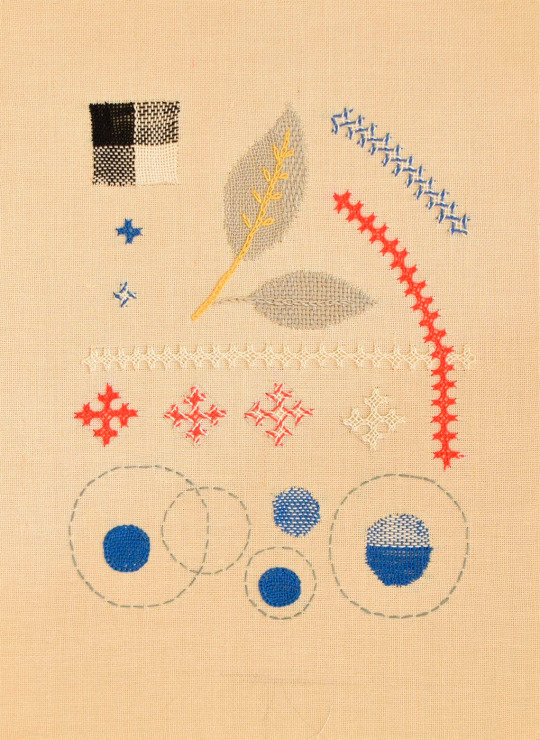
Rebecca Crompton, Sampler, (embroidered linen in coloured silks), 1930s [Victoria and Albert Museum, London. © Rebecca Crompton]

342 notes
·
View notes
Text
The Times:
Rebecca Crompton, Theo’s mother, said they had been on their way to school when they changed their mind at the last minute to see the couple at the Holyhead RNLI lifeboat station.
Theo was picked from the crowd by William’s private secretary, Jean-Christophe Gray, so he could give the roses they had brought to the prince and princess himself.
As the princess admired his school tie, William joked to his private secretary: “He’s got a smarter tie than you, J-C!”
Afterwards, Crompton said: “I’m overwhelmed. He has been holding flowers stood here for a while. We just thought it would be a once in a lifetime opportunity to come down.”

166 notes
·
View notes
Quote
Homosexuality was both silenced and taboo. Most historians agree that the concept of homosexuality is modern because the idea of sexual identity was not fully established until the nineteenth century. Jo Stanley has suggested that many women who fell in love with women could not identify or understand their feelings. Historians of transvestism Ruldolf Dekker and Lotte van de Pol have argued that 'it is logical that these women would think: if I covet a woman, I must be a man'. Lesbians may have thought that cross-dressing and acting like men allowed them to love women during a time in which Europeans could not conceive of the idea of lesbianism.
Rebecca Alexandra Simon, Pirate Queens: The Lives of Anne Bonny & Mary Read, p81-82
This is the sort of absolute bullshit I’m talking about when I talk about the myth that sexual orientation and sexual identity didn’t exist until the nineteenth century. To be clear when I talk about this I’m not trying to downplay the pathologization of homosexuality that happened throughout the nineteenth and twentieth centuries and the effects that had on queer people. I’m simply talking about this myth that pre-nineteenth century people had no understanding of their own sexual desires and no sexual identity.
First of all it is just blatantly untrue to suggest that 18th century Europeans “could not conceive of the idea of lesbianism”.
I often see the fact that sex between women was legal in England used as evidence that 18th century Europeans didn’t know that sex between women was possible. But people seem to be forgetting that England is not the entirety of Europe.
There are cases of women being executed for having sex with women across Europe, they would be drowned or even burned alive. (see Louis Crompton, The Myth of Lesbian Impunity Capital Laws from 1270 to 1791)
Often the wording of sodomy laws were vague but could be interpreted as covering sex between women. Often supplementary documents would clarify for example a 1780’s French legal book defines sodomy as:
the crime of any man with a man, of any woman with a woman; even of a man with a woman, when, by unimaginable debauchery, they do not use the ordinary path of procreation.
(Michael David Sibalis, The Regulation of Male Homosexuality in Revolutionary and Napoleonic France, 1789-1815, p81)
However some laws explicitly criminalised sex between women. For example the Constitutions of the Holy Roman Emporer Charles V, 1532, states:
if anyone commits impurity with a beast, or a man with a man, or a woman with a woman, they have forfeited their lives and shall, after the common custom, be sentenced to death by burning.
And the 1574 statutes of the Italian town Treviso were very clear:
If any person (leaving the natural use) has sexual relations with another, that is, a man with a man if they are fourteen years old or more, or a woman with a woman if they are twelve or more, by committing the vice of sodomy-popularly known as “buzerones” or “fregatores”-and this has been revealed to the city magistrates, the detected person, if a male, must be stripped of all his clothes and fastened to a stake in the Street of the Locusts with a nail or rivet driven through his male member, and shall remain there all day and all night under a reliable guard, and the following day be burned outside the city. If, however, a woman commits this vice or sin against nature, she shall [also] be fastened naked to a stake in the Street of the Locusts and shall remain there all day and night under a reliable guard, and the following day shall be burned outside the city.
(Crompton, p18)
But even if we are just talking about England there are references to lesbianism in 18th century England. In fact the earliest known usage of the word lesbian (in the sense of a woman who is sexually or romantically attracted to other women) is from The Toast by William King published in 1732:
this little Woman gave Myra more Pleasure than all the rest of her Lovers and Mistresses. She was therefore dignified with the Title of Chief of the Tribades or Lesbians.
Hester Thrale Piozzi described the Ladies of Llangollen as “damned Sapphists” (Emma Donoghue, Passions Between Women, p168) and suspected Anne Damer of “liking her own Sex in a criminal Way”. (Diary of Hester Thrale Piozzi, 17 June 1790) Damer was also satirised as a lesbian in the 1778 poem A Sapphick Epistle and the 1794 pamphlet The Whig Club.
There were many references to the ancient Greek poet Sappho who was often credited with inventing the concept of sex between women. A Sapphick Epistle describes Sappho as “the first Tommy the world has upon record; but to do her justice, though there hath been many Tommies since, yet we never had but one Sappho.”
“Tommy” being another word for a women who were sexually interested in women. We see this word used in the 1773 poem The Adulteress:
Women and Men, in these unnat’ral Times,
Are guilty equal of unnat’ral crimes:
Woman with Woman act the Manly Part,
And kiss and press each other to the heart.
Unnat’ral Crimes like these my Satire vex;
I know a thousand Tommies ‘mongst the Sex:
Sappho was also invoked in the 1749 pamphlet Satan’s Harvest Home:
Sappho, as she was one of the wittiest Women that ever the World bred, so she though with Reason, it would be expected she should make some Additions to a Science in which Womankind had been so successful: What dose she do then? Not content with our Sex, begins Amours with her own, and teaches the Female World a new Sort of Sin, call’d the Flats, that was follow’d not only in Lucian’s Time, but is practis’d frequently in Turkey, as well as at Twickenham at this day.
“Flats” refers to the “game of flats” or “game at flats” which was an 18th century euphemism for tribadism and is referenced again in Satan’s Harvest Home:
I am credibly informed, in order to render the Scheme of Iniquity still more extensive amongst us, a new and most abominable Vice has got footing among the W—n of Q—–y, by some call’d the Game at Flats;
So while its true that sex between women wasn’t illegal in England this wasn’t because the entire country was ignorant to the possibility.
The myth that there was no sense of identity associated with sexual attraction is easily disproven by the molly subculture. In 18th century London there was a community of men who had sex with men, who identified as mollies. Mollies would meet in molly houses, they had their own traditions, slang, songs and even had sobriquets known as maiden names that identified them as part of the group. (see Mother Clap's Molly House by Rictor Norton)
There is also evidence of 18th century men understanding their attraction to other men as something innate and natural to them. For example Gerrit van Amerongen stated at his 1776 sodomy trial that men who had sex with men were “born with it and they can be as amorous to each other as man and wife can be.” (Anna Clark, The Chevalier d’Eon, Rousseau, and New Ideas of Gender, Sex and the Self in the Late Eighteenth Century)
Lillian Faderman suggests that women were less likely to recognise their sexual attraction to each other because they would have “internalized the view of females as having little sexual passion” and as they bore “no burden of visible proof as men do, they might deny it even to themselves”. (Surpassing the Love of Men, p16) However Chris White rather succinctly dismisses Faderman’s argument: “it seems hardly credible that simply because women did not have penile erections they would not have recognized how sexual arousal felt and what it meant”. (Emma Donoghue, Passions Between Women, p122)
Taking all of this into consideration it seems somewhat absurd to claim that “women who fell in love with women could not identify or understand their feelings”.
And this is not even getting into the “if I covet a woman, I must be a man” statement which is a whole other can of worms to unpack.
98 notes
·
View notes
Video
vimeo
Hyundai "Dream" from Emile Rafael on Vimeo.
Client – HYUNDAI @hyundai
Brand Manager – Alexander Biglands
Product Manager – Máxime Deloget
Digital Experience – Omer Candan
Agency – AKQA @akqa
Senior Agency Producer – Cynthia Chabu @cys57
Associate Creative Director – TK Tenns @tk.tenns
Executive Producer - Anders Paus Hedberg
Director – Emile Rafael @helloemile
Production Company – Future Frank @futurefrank.xyz
Future Frank Global EP – Miguel Teixeira @_ohmiguel_
Future Frank Producer – Alex Heringa @alexheringa
Future Frank Line Producer – Robert Farrelly @_roobtube_
Music - SUPERMODEL
Sound - Rascal Post
Sound Designer - Izaak Buffin
Producer - Maddy Lebel
1st AD – Damien Hope @damienhope
DOP – Martijn Melis @martijnmelis
1st AC – Justus Engelbracht @jengeltj
Gaffer – Erik de Wildt
Best Boys – Aaron Homma @hommaaaaaaa, Yoshua Thomassen @yoshua.thomassen, Jeroen de Jong, Said Snono @saidsnono
Grip – Daan Dillo, Melle Vaarzon Morrel @vaarzon, Roy van den Vlekkert
Art Director – Nathalie Veen @nathalie.veen
Set Dresser – Ruben Soffers
Set Dresser – Cas Klaasen
Stylist – Olivier Jehee @olivierjehee
MUA – Faisa Sontodimedjo @faisa.s
BTS Photography – Alina Danylchuk @alina.danylchuk, Julia Nawacka @jn_99__
PA – Stephanie Elout @stephanieelout
PA – Siebe Stolk
Catering – Nathalie – Lunch Idee @lunchidee
On-site Editor – Bruno Verhaar
VTR/ Data Wrangler – Joep Bannenberg
READYSET TEAM
Virtual Production Studio – @readyset_studios, Nils Pauwels @nils_pauwels
Virtual Production Coordinator – Gijs de Groot
VP Technician – Daan Geurts
VP Supervisor – Robert Okker
Unreal Engine Operator – Philippe Trijnes @philippetrijnes
Unreal Engine Operator – Jarno Blankesteijn @jarno_blankestijn
UNIT B
DP – Roy van Egmond @roy_van_egmond
1st AC – Paco Kumar @pacokumar
Best Boy – Aron Homma @hommaaaaaaa
Best Boy – Yannick Giraud @yannick_giraud
Best Boy – Angelo Hogewoning
POST–PRODUCTION
Post Production – Glassworks @glassworksvfx
VFX Supervisor / 2D Artist – Nils Crompton @nilcompton
2D Artists – James Mortner @jamesmortner, Muhammad Danyaro
Colourist – Jonny Thorpe @kingofcurtis
Colour Assists – Daniela Rotaru @dani_simone_r, Vanessa Aparicio @vanessa_colour
COO / Executive Producer – Chris Kiser @chriskiser
Head of 3D – Rüdiger Kaltenhäuser
Executive Producer – Rebecca Johnson
Producer – Sezen Akpolat @sezenakpolat
Production Coordinator – Maryam Zahid @maryamzahid123
MCR – Andrew Kidd
0 notes
Text
ZH: UK’s “Online Safety Act” Officially Grants MSM Premission To Publish Lies
COGwriter
ZeroHedge posted the following:
UK’s “Online Safety Act” Officially Grants MSM Premission To Publish Lies
February 4, 2024
Welcome to the UK where it’s now official government policy that you CAN’T publish “misinformation”, but The Guardian, the BBC, Disney and Netflix CAN…
Yes, it’s true – the recently signed “Online Safety Act” brands the publication of “false information” a criminal offense punishable by up to a year in prison…
…unless you’re an MSM outlet, when it’s totally fine.
Think even the corrupt & bloated criminal class that rules over us would never dare be that blatant?
Take a look at section 179 making it illegal to publish false information with intent to cause harm:
…and then look at section 180, which exempts all MSM outlets from this new law :
…and that’s without even getting into OfCom’s “select committee”, or how they choose to define “misinformation” (s. 152)
Welcome to the modern definition of “freedom of speech”, where the MSM are directly and explicitly permitted to “knowingly publish false information with intent to cause non-trivial harm”, and you can be sent to jail for a year for calling out their lies. …
With the EU’s own Digital Services Act coming into force later this month, and all the focus on “misinformation and disinformation” at Davos two weeks ago, we can see the real crackdown on internet free speech is about to kick into gear. https://www.zerohedge.com/political/uks-online-safety-act-officially-grants-msm-premission-publish-lies
We continue to see more and more steps toward totalitarianism. So-called “safeguards” to limit this to “knowingly publish false information with intent to cause non-trivial harm” are a joke because the censors tend to think that if they do not agree with something, it must harm someone, somehow.
Yes, this is leading to ‘666’ type controls (cf. Revelation 13:15-18)
Here is something that Wikipedia posted about this improperly titled Online Safety Act:
The international human rights organization Article 19 stated that they saw the Online Safety Act 2023 as a potential threat to human rights, describing it as an “extremely complex and incoherent piece of legislation”.[29] The Open Rights Group described the OSB as a “censor’s charter”.[30]
During an interview for the BBC, Rebecca MacKinnon, the vice president for global advocacy at the Wikimedia Foundation, criticised the OSB, saying the threat of “harsh” new criminal penalties for tech bosses would affect “not only big corporations, but also public interest websites, such as Wikipedia“.[31] In the same instance, MacKinnon argued the Act should have been based on the European Union‘s Digital Services Act, which reportedly included differences between centralised content moderation and community-based moderation.[31] In April 2023, both MacKinnon and the chief executive of Wikimedia UK, Lucy Crompton-Reid, announced that the WMF did not intend to apply the age-check requirements of the Act to Wikipedia users, stating that it would violate their commitment to collect minimal data about readers and contributors.[32][33] On 29 June of the same year, WMUK and the WMF officially published an open letter, asking the government and Parliament to exempt “public interest projects”, including Wikipedia itself, from the OSB before it entered its report stage, starting on 6 July.[34][35]
Apple Inc. criticised legal powers in the OSB which threatened end-to-end encryption on messaging platforms in an official statement, describing the act as “a serious threat” to end-to-end encryption, and urging the UK government to “amend the Bill to protect strong end-to-end encryption”.[36][37]
Meta Platforms has criticised the plan, saying, “We don’t think people want us reading their private messages … The overwhelming majority of Brits already rely on apps that use encryption to keep them safe from hackers, fraudsters and criminals”.[25] Head of WhatsApp Will Cathcart voiced his opposition to the OSB, stating that the service would not compromise its encryption for the proposed law and saying “The reality is, our users all around the world want security – ninety-eight percent of our users are outside the UK, they do not want us to lower the security of the product and just as a straightforward matter, it would be an odd choice for us to choose to lower the security of the product in a way that would affect those ninety-eight percent of users.”[38][39] He also stated in a tweet that scanning everyone’s messages would destroy privacy.[40]
Ciaran Martin, a former head of the UK National Cyber Security Centre, accused the government of “magical thinking” and said that scanning for child abuse content would necessarily require weakening the privacy of encrypted messages.[25]
(Online Safety Act. Wikipedia, accessed 02/04/24)
Last year, Michael Snyder posted the following:
The UN’s New Fact-Checking System Called “iVerify” Will Be Used To Crack Down On “Misinformation” All Over The World
Our world is becoming a creepier place with each passing day. … And a new tool that was just introduced by the UN will make it much easier for them to control what we write on the Internet…
The iVerify System Is Here
The UN’s new fact-checking system is going to be a game changer, but so far the mainstream media is being really quiet about it.
Perhaps that is because they don’t want millions of us to object to this sort of tyranny.
The UN developed iVerify in conjunction with big tech companies and Soros-funded organizations, and it will be used to crack down on “disinformation” and “hate speech” all over the globe…
The United Nations has unveiled an “automated” fact-checking service to counter so-called disinformation and hate speech on the internet in a project partnered with Big-Tech and Soros-funded organisations.
In response to what they brand as “online information pollution”, which they claim is a “global challenge”, the United Nations Development Programme (UNDP) has launched its iVerify platform to counter alleged disinformation and hate speech online.
The global body’s “automated fact-checking tool”, was developed in partnership with the United Nations International Computing Centre (UNICC), Facebook and Google-funded fact checker Meedan, the Meta-owned CrowdTangle, and the Soros-funded International Fact-Checking Network (IFCN).
Needless to say, this tool will not be used to crack down on points of view that Big Tech and George Soros agree with. 06/19/23 https://endoftheamericandream.com/the-uns-new-fact-checking-system-called-iverify-will-be-used-to-crack-down-on-misinformation-all-over-the-world/
Increased censorship endorsed by the UN is not a surprise.
As I posted back in 2021:
More internet censorship is expected. (Thiel B. United Nations removing web registrars. COGwriter , December 2021)
Notice also the following:
Isaiah: Lack of Truth in End-of-Days
The Talmud (97a) goes into great detail describing the conditions in the days preceding the final redemption. One condition is based on a prophecy written in the Book of Isaiah.
And so redress is turned back And vindication stays afar, Because honesty stumbles in the public square And uprightness cannot enter. Honesty has been lacking, He who turns away from evil is despoiled.” Hashem saw and was displeased That there was no redress. Isaiah 59:14-15
The Talmud explains the verse:
What is the meaning of the phrase: And the truth is lacking [ne’ederet]? The Sages of the study hall of Rav said: This teaches that truth will become like so many flocks [adarim] and walk away. What is the meaning of the phrase: “And he that departs from evil is negated”? The Sages of the study hall of Rabbi Sheila said: Anyone who deviates from evil is deemed insane by the people.
Rabbi Yosef Berger, the rabbi of King David’s Tomb on Mount Zion, explained that the information revolution initiated by advances in technology made the dissemination of information far easier and widespread but at the same time, made truth entirely subjective.
“In Judaism, a Torah scroll is handwritten, copied letter by letter from an existing Torah scroll,” Rabbi Berger said. “Inspection of Torah scrolls from thousands of years ago prove that this method of transmission is very accurate and results in faithful copies. Even after thousands of years and Jews being exiled to every nation, the Torah of the Jews remains a universal truth that does not change.”
“For thousands of years, no one denied the Torah was truth and no one could deny a truth that was seen by all. Now, something could be on the internet today and tomorrow it will be forgotten and a new truth will take its place. Part of the liberal methodology is to rewrite history, even what was universally agreed to be the truth.” October 19, 2020 https://www.israel365news.com/159725/internet-censorship-pre-messiah-evil-described-by-isaiah/
It is not just the Hebrew scriptures or the Jewish Talmud that warns people will not hear the truth. Notice the following from the New Testament about what will happen prior to the Messiah’s return:
13 But evil men and seducers shall wax worse and worse, deceiving, and being deceived. (2 Timothy 3:13, KJV)
12 … they all may be condemned who did not believe the truth but had pleasure in unrighteousness. (2 Thessalonians 2:12, NKJV throughout unless otherwise specified)
Not only is there prophesied an increase in deceit, the Bible prophecies totalitarian controls (cf. Revelation 13). Artificial intelligence will be used.
As Artificial Intelligence and totalitarian controls go, the Continuing Church of God (CCOG) put out the following video on our Bible News Prophecy YouTube channel back in 2018:
youtube
15:30
Artificial Intelligence and Prophecy
Billionaire Elon Musk declared he was worried that artificial intelligence (AI) may lead to the rise of an “immortal dictator,” a “godlike” entity that could take over the world. Is this accurate, or at least, close in some ways? Does Bible prophecy foretell of the rise of an immoral leader who considers himself above all gods? Will this result in great destruction? What is AI? How might it fit in with various prophecies? Was the increase in technological knowledge we now have prophesied over 2000 years ago? Will 666 control over buying and selling involve any form of AI? Dr. Thiel goes over many scriptures, including prophetic ones, that involve human knowledge–which is the basis of AI. He also points out that when various prophesies were made, there was no technology capable of fulfilling them, but that because of computers, such ability exists now. Dr. Thiel also points out what Jesus will do about it.
Here is a link: Artificial Intelligence and Prophecy.
The above was made PRIOR to COVID-19.
In 2023, we did numerous videos about the rise and use of AI:
ChatGPT and 666
Is AI in the Bible?
AI Jesus? Artificial Intelligence God?
666, the Censorship Industrial Complex, and AI
Artificial Intelligence Superhuman Persuasion?
The UN, Big Tech, various governments, and others are using algorithms and AI to censor and block information.
Biblically, we know that more censorship is prophesied as the prophet Amos warned:
11 “Behold, the days are coming,” says the Lord God,
“That I will send a famine on the land,
Not a famine of bread,
Nor a thirst for water,
But of hearing the words of the Lord.
12 They shall wander from sea to sea,
And from north to east;
They shall run to and fro, seeking the word of the Lord,
But shall not find it. (Amos 8:11-12)
Notice that the Bible tells of a time that will come when the word of God will not be found. I do not believe that this means that there will be no more Bibles–but preaching aspects of it will be made illegal and that those wanting to better understand it will have trouble finding explanations.
Satan’s plan is to try to stop preaching the gospel of the kingdom of God–while it will happen anyway (cf. Matthew 24:14)–there will be more restrictions, as well as a coming persecution.
We continue to see steps taken to give governments more and more power to suppress the truth.
Do you see what is happening and how that ties into properly understood biblical prophecies?
Related Items:
Should the Church Still Try to Place its Top Priority on Proclaiming the Gospel or Did Herbert W. Armstrong Change that Priority for the Work? Some say the Church should mainly feed the flock now as that is what Herbert W. Armstrong reportedly said. Is that what he said? Is that what the Bible says? What did Paul and Herbert W. Armstrong expect from lower level leaders? Two related sermons are available The Work per HWA and the Bible and Priority of the Philadelphia Work.
Preparing for the ‘Short Work’ and The Famine of the Word What is the ‘short work’ of Romans 9:28? Who is preparing for it? Will Philadelphian Christians instruct many in the end times? Here is a link to a related video sermon titled: The Short Work. Here is a link to another: Preparing to Instruct Many.
The Gospel of the Kingdom of God This free online pdf booklet has answers many questions people have about the Gospel of the Kingdom of God and explains why it is the solution to the issues the world is facing. It is available inover 1,000 languages at ccog.org. Here are links to four kingdom-related sermons: The Fantastic Gospel of the Kingdom of God!, The World’s False Gospel, The Gospel of the Kingdom: From the New and Old Testaments, and The Kingdom of God is the Solution.
Internet Censorship and Prophecy Are concerns about internet censorship limited to nations such as Russia, China, Iran, and North Korea. But what about the USA, Canada, and Germany? What about the European Union? What about internet media companies such as Facebook, Google, YouTube, or email services like MailChimp? Has the attempt to control information been made by various ones over the centuries? Was the New Testament affected by it? What about the church throughout the centuries? Has the Bible already been partially censored? Which Bible prophecies point to coming Internet censorship? What about the Book of Amos? What about the coming 666 Beast and final Antichrist? Is there anything that can be done about this? Should Philadelphian Christians be working on anything now? Will preaching the Gospel of the Kingdom of God vs. a highly media-supported alternative lead to a ‘famine of the word’? More internet censorship is coming as various statements in the Bible support.
United Nations: Humankind’s Last Hope or New World Order? Is the UN the last hope for humanity? Or might its goals end up with sinister results? Two related videos include UN’s ‘New Universal Agenda’ is a False Gospel! and United Nations and Vatican Are Planning the New World Order.
Persecutions by Church and State This article documents some that have occurred against those associated with the COGs and some prophesied to occur. Will those with the cross be the persecutors or the persecuted–this article has the shocking answer. There are also three video sermons you can watch: Cancel Culture and Christian Persecution, The Coming Persecution of the Church, and Christian Persecution from the Beast. Here is information in the Spanish language: Persecuciones de la Iglesia y el Estado.
Orwell’s 1984 by 2024? In 1949, the late George Orwell wrote a disturbing book about a totalitarian government called “nineteen-eighty four.” Despite laws that are supposed to protect freedom of speech and religion, we are seeing governments taking steps consistent with those that George Orwell warned against. We are also seeing this in the media, academia, and in private companies like Google, Facebook, and Twitter. With the advent of technology, totalitarianism beyond what Orwell wrote is possible. Does the Bible teach the coming a totalitarian state similar to George Orwell’s? What about the Antichrist and 666? Will things get worse? What is the solution? Dr. Thiel answers these questions and more in this video.
Canadian censoring of the Bible In 2017, Lauri Skori of the Battle River School board told a religious school in Alberta, Canada that it could not teach/read certain portions of the Bible. In 2002, a court in Canada ruled against one who referred to certain scriptures that some homosexuals objected to. In 2017, there was “An Act to Amend the Canadian Human Rights Act and Criminal Code” related to those who wish to be considered transgendered. Government officials in Canada and elsewhere have been ruling against the Bible. Is any of this prophesied? Will this get worse? What was the prophet Amos inspired to write? This is a video.
Internet Control, Famine of the Word, and 666 Is the internet going to be used to suppress the teaching of the word of God?
LATEST NEWS REPORTS
LATEST BIBLE PROPHECY INTERVIEWS
0 notes
Photo
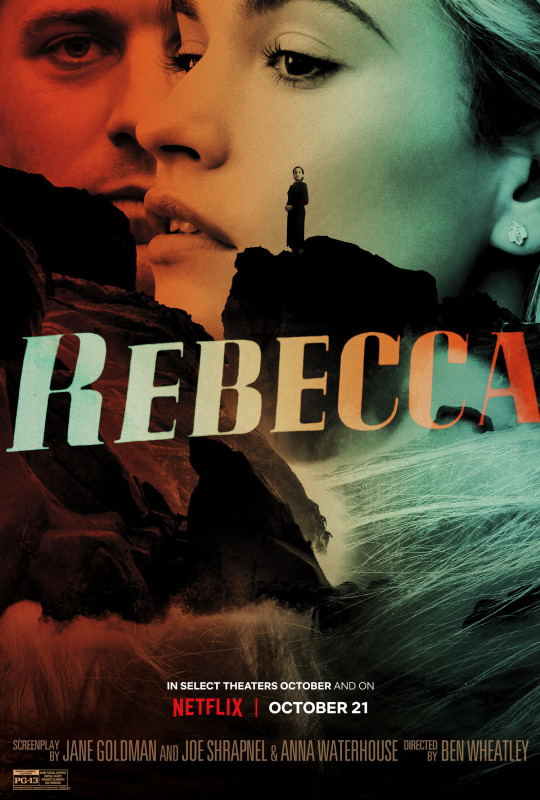
#Rebecca#Ben Wheatley#Lily James#Armie Hammer#Kristin Scott Thomas#Ann Dowd#Tom Goodman-Hill#Sam Riley#Keeley Hawes#Ben Crompton#Bryony Miller
29 notes
·
View notes
Photo





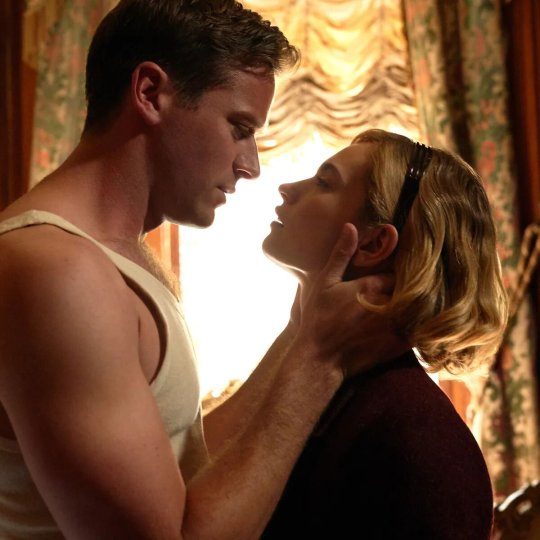

Rebecca (2020) Ben Wheatley
June 6th 2021
#rebecca#2020#ben wheatley#lily james#armie hammer#kristin scott thomas#tom goodman-hill#ann dowd#sam riley#bryony miller#keeley hawes#jeff rawle#ben crompton#mark lewis jones#bill paterson#john hollingworth
5 notes
·
View notes
Text
📽 Rebecca (2020)
Ho. Ly. Crap. 😱😱 This movie, y’all... I knew nothing about this story going into it besides what I knew from the trailer. I absolutely, 100% loved it! I’m a sucker for a good mystery and this one left me guessing. I would think I had figured it out only for another plot twist to be thrown in. I loved it so much I bought the book. (Haven’t read it yet but I’ll do a review of it when I have.) Apparently there’s another movie adaptation from Alfred Hitchock, but I haven’t watched that one yet. Anyway, this version is really good and even better because it’s pretty clean for the most part. 10/10 would recommend.
*i just looked on IMDb and apparently not everyone loved it as much as I did. Just a disclaimer*
Sex/nudity: 3/10 (one non-graphic sex scene, a couple references)
Language: 2/10 (not horrible, some OMGs and stuff like that)
Violence: 1/10 (it talks about some but I don’t remember it showing any violence)
Overall rating: 10/10
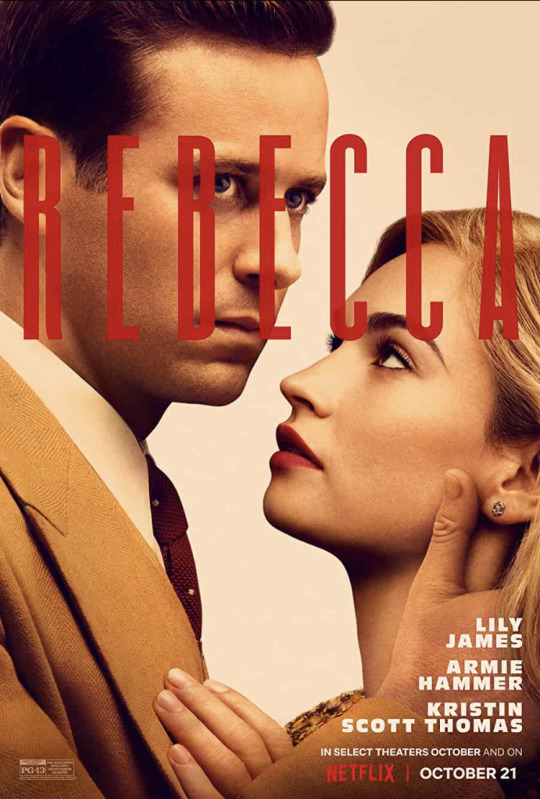
#review#movie#movie review#drama#mystery#romance#thriller#rebecca#lily james#mrs de winter#ann dowd#kristin scott thomas#mrs danvers#armie hammer#maxim de winter#tom goodman hill#ben crompton#john hollingworth#keeley hawes#jane lapotaire#sam riley
2 notes
·
View notes
Text
What is going onnnnnn????
Lily James Instagram story!
#lily james#armie hammer#rebecca#Kristin Scott Thomas#Tom Goodman-Hill#Keeley Hawes#Ann Dowd#sam riley#ben crompton#mark lewis jones#jane lapotaire#wheres the trailer#stop with the teasing please#2020
6 notes
·
View notes
Text
New IG picture shared by Rebecca's director.
Looking at the pebble beach, it looks like they're filming scenes in Corwall? (Update. à Nice, FR!)
undefined
instagram
#armie hammer#cmbyn#call me by your name#armie hammer rebecca filming#rebecca bts#rebecca#ben wheatley#lily james#kristin scott thomas#keeley hawes#ann dowd#sam riley#ben crompton#daphne du maurier#maxim de winter#062019 armie hammer
14 notes
·
View notes
Text

Rebecca Crompton, Tray Cloth, (machine-embroidered organdie with silks, applied), 1938 [Victoria and Albert Museum, London. © Rebecca Crompton]
101 notes
·
View notes
Photo



1930s Rebecca Crompton embroidery samplers (first one would make a great tattoo…)
98 notes
·
View notes
Text
February 2022 Books
The Missing Piece of Charlie O’Reilly by Rebecca Ansari
An interesting premise with some exciting twists, but I was left with some questions how one aspect of the plot worked and had a content issue with a minor subplot.
The House with a Clock in Its Wall by John Bellairs
Should have known what I was in for with this one. Goodness knows I love atmospheric creepy old houses, and the characters were interesting. Just wasn’t crazy about the plot.
The Raven Heir by Stephanie Burgis
Had an intriguing set-up and characters with potential, but I waited in vain for them to develop more depth.
The Half Sisters by Natalie Savage Carlson
Came for the middle-grade sisterly drama. Did not expect a very tragic event to casually occur near the end. A cute book overall but a bit emotionally hard to take, and I don’t think I’ll seek out the sequel.
Winterborne Home for Vengeance and Valor by Ally Carter
I don’t know what I expected out of this one, but it wasn’t big on substance, even by middle-grade standards.
Lucie Babbidge’s House by Sylvia Cassedy
Somehow I’ve ended up reading a lot of doll/dollhouse-themed fiction lately, and this instance was maybe the most eerie. An orphaned girl bullied at her boarding school uses a dollhouse and dolls she has found or improvised to act out the kind of life and family she wishes she had, while the letters she receives from a pen pal start to reflect the stories she tells after the fact.
The Sisters of Straygarden Place by Hayley Chewins
I decided I wanted to read this one because I saw it in the bookstore and thought the cover was gorgeous, and amazingly that turned out to be a good call. Poetic, creepy in a good way, and ultimately beautiful and satisfying.
Al Capone Does My Shirts and Al Capone Shines My Shoes by Gennifer Choldenko (partial reread)
I read the first of this series years ago and revisited it after acquiring the first sequel. Choldenko not only tells a good story but has apparently very thoroughly done her research on life on Alcatraz for the families of prison workers in the 1930s and includes long fascinating author’s notes with cited sources!
Death on the Nile by Agatha Christie (reread)
Reread before seeing the film.
She and the Dubious Three by Dorothy Crayder
Although I was kind of disappointed that Jasper wasn’t in this one (for completely reasonable reasons), Maggie is always a delight, and it was great fun to join in her shenanigans in 1970s Italy.
The Children of Hermitage by Frances E. Crompton
An E. Nesbit-esque story of the large-family-and-slice-of-life genre. Crompton’s children are delightfully distinct and lifelike, and I enjoyed this one more than I expected.
The Green Garland by Frances E. Crompton
...although I was less taken with this one, which had potential in the premise but went a bit heavy-handed on the moralizing (this is, after all, a Victorian children’s book and that comes with the territory).
War and Millie McGonigle by Karen Cushman
Middle-grade historical fiction set in southern California just before the US’s entrance into WWII. Cushman has clearly done her research (not to mention has a husband who grew up in that time and place), and the setting accordingly feels very authentic. And the story is charming. I enjoyed it more than I expected to.
Louisiana’s Way Home by Kate DiCamillo
DiCamillo can spin some of the most beautiful, sad, bizarre tales, and this was no exception. I don’t know if I would have grasped it as a child, but my adult heart ached for Louisiana, with all the adults in her life failing her, but the ending was refreshingly hopeful.
Journal 3 and Lost Legends by Alex Hirsch et al. (reread)
I rewatched Gravity Falls recently and had A Hankering.
The Abandoned by Paul Gallico
This was a weird book that I acquired somewhere for some reason and I have no idea what to make of it.
Howl’s Moving Castle by Diana Wynne Jones (reread)
Reread for jellicoelodge.
The Art of Encanto by Juan Pablo Reyes Lancaster Jones et al.
Beautiful. There’s so much possibility in this fictional world, and I enjoyed getting a glimpse of the process of creating it.
The Invention of Wings by Sue Monk Kidd
Our English honor society had a Blind Date with a Book event--you chose a wrapped book knowing only the genre and whatever vague description the wrapper provided. The one I chose, which seemed the most doable of a not especially promising lot, had the blurb “Two girls become friends in terrible circumstances” or something like that.
It was not a very good description.
I’ll spare you the full rant, but basically the protagonists are connected but never really become friends in any meaningful sense, I found the historical setting unconvincing, and I was reminded why I don’t read a lot of recently-written fiction aimed at adults.
Her Majesty, Grace Jones by Jane Langton
The young daughter of a poor American family in the 1930s convinces herself that she is secretly the lost eldest daughter of the King of England. Both amusing and touching.
Look Through My Window by Jean Little
There’s a lot going on in this one with surprisingly complex relationships for a middle-grade novel. It even tackles the issue of navigating friendships with religious differences--something I don’t see a lot in fiction. I liked the characters and will look for the sequels.
Trina by Patricia Miles Martin (reread)
My mom had this book, leftover from a college children’s literature class (I think), when we were kids. Unfortunately we were hard on books, and I suspect it didn’t survive our numerous moves. I hadn’t read it in years, but the familiarity came flooding back. It’s about friendship and overcoming language barriers--a simple story but charming.
Valiant by Sarah McGuire (reread)
Reread on a whim.
The Cuckoo Clock by Mary Louisa Molesworth
I forget which book I read that mentioned this one (just remembered: it was Marianne Dreams), but it was apparently a pretty significant Victorian fantasy. Charming overall, with a few very Victorian tropes that haven’t aged as well.
The Extremely Inconvenient Adventures of Bronte Mettlestone by Jaclyn Moriarty
Cute and whimsical but I’m already struggling to remember it. There were a lot of aunts.
Kingdom of Secrets by Christyne Morrell
I wanted to love this one. I’m normally very fond of friendships between the Zany Person and the Cautious Person who gets dragged into their chaos. And that more or less happened here, but the characters and world felt undeveloped to me. One-dimensionally evil villains. Melodramatic backstories. Relatively easily resolved political issues. A pity.
Here in the Real World by Sara Pennypacker
This is in the “sad children work on a secret project together and inadvertently provide themselves and each other with much-need therapy” genre. So I liked it.
The Remarkable Invention of Walter Mortinson by Quinn Sosna-Spear
I prefer my whimsical tales without a pervasive attitude of I’m Not Like Those Ordinary People, thank you.
Midnight in the Dollhouse by Marjorie Filley Stover
I remember liking it but can’t remember much else.
Noel Streatfeild’s Christmas Stories by Noel Streatfeild
My favorite was the one about the ballet-loving princess who gets a chance to dance incognito. So gloriously Streatfeildish a plot.
The House of Months and Years by Emma Trevayne
I picked this up at a bookstore with no idea about it beyond thinking it looked interesting. The calendar house is a fascinating setting, and the story itself was deliciously creepy.
The Christmas Fairy and Other Stories by John Strange Winter, Mary Louisa Molesworth, and Frances E. Crompton
Crompton’s story is devastatingly tragic, Moleworth’s is aggressively moralistic, and Winter’s is about schoolboys being rescued from having to spend Christmas at boarding school and I feel bad for thinking that my take on that theme had more interest.
7 notes
·
View notes
Link
0 notes
Text
Armie Hammer in 2020
So, in 2020 We will hopefully see Armie in- 1. On Broadway in a Tracy Letts play called "The Minutes" directed by Anne Shapiro co-starring Tracy Letts, Jessie Mueller among others 2. Dreamland-directed by Nicholas Jarecki, co-starring-Gary Oldman,Evangeline Lily, Indira Varma, Luke Evans, Kid Cudi, Lily Rose Depp among others
3.Rebecca-directed by Ben Wheatley, co-starring Lily James, Kristin Scott Thomas, Ann Dowd, Keely Hawes, Sam Reily, Ben Crompton among others
4.Death on the Nile-Directed by Kenneth Branaugh, co-starring Gal Gadot,Annette Bening, Letitia Wright, Rose Leslie, Dawn French, Sophie Okenedo, Jennifer Saunders, Ali Fazal, Russell Brand among others
DO YOU ALL MIND IF I SCREAM?
75 notes
·
View notes
Photo




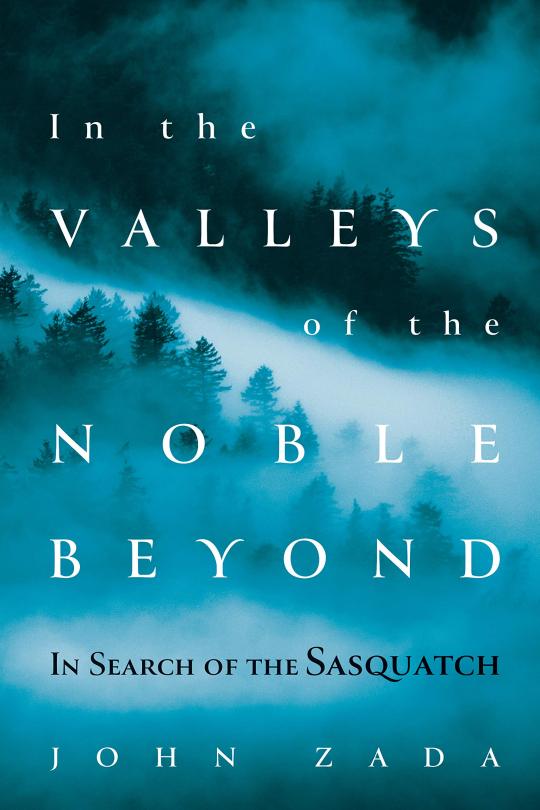


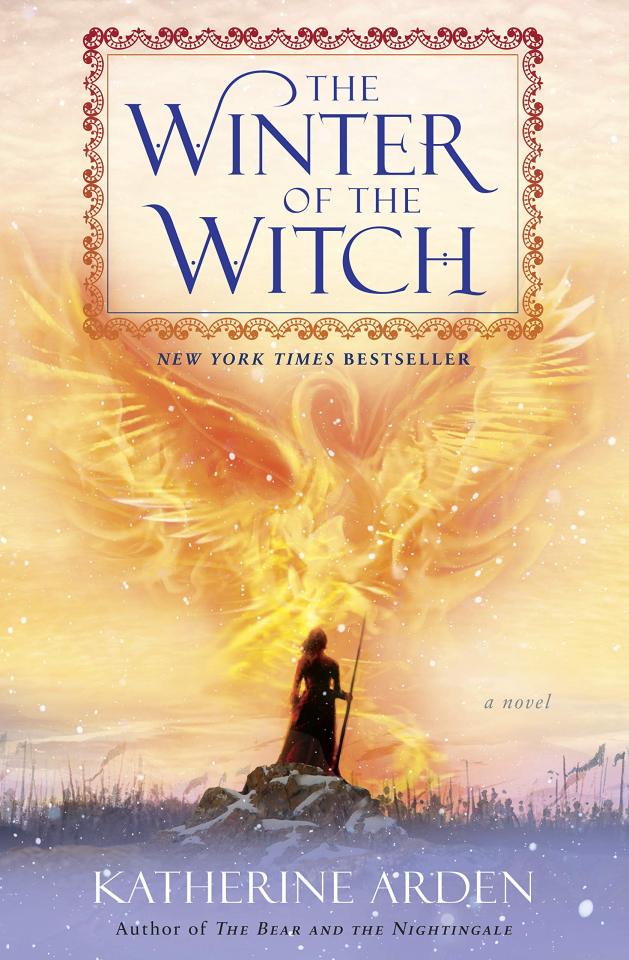
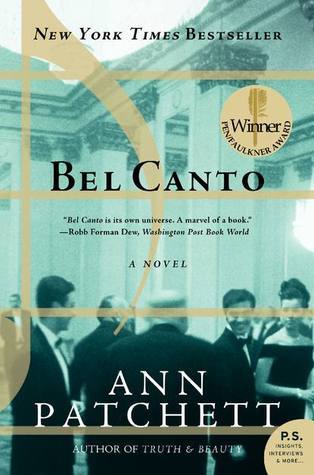
Favorite Books in 2019
A Map of Days by Ransom Riggs
Underland by Robert Macfarlane
The Voyage of the Narwhal by Andrea Barrett
The Seven Husbands of Evelyn Hugo by Taylor Jenkins Reid
In the Valleys of the Noble Beyond by John Zada
The Terror by Dan Simmons
The Nightingale by Kristin Hannah
The Winter of the Witch by Katherine Arden
Bel Canto by Ann Patchett
Some other favorites included The Time Traveller’s Guide to Medieval England by Ian Mortimer, Split Tooth by Tanya Tagaq, In the Heart of the Sea by Nathaniel Philbrick, Red Clocks by Leni Zumas, There There by Tommy Orange, Slammerkin by Emma Donoghue, Nightwoods by Charles Frazier, The Which Way Tree by Elizabeth Crook, Magic Words by Gerald Kolpan, Church of Marvels by Leslie Parry, and Kissing the Witch by Emma Donoghue
Read 68 books this year (includes a few re-reads too). Full list under the read more. Love discussing books so let me know if you’ve read any of them and loved/disliked them, or have any questions about any of them, or just want to chat about books!
January
The Girl in the Tower by Katherine Arden
The House of the Seven Gables by Nathaniel Hawthorne
The Rise and Fall of the Dinosaurs by Steve Brusatte
Vampires in the Lemon Grove by Karen Russell
The Sawbones Book by Sydnee and Justin McElroy
The Time Traveler’s Guide to Medieval England by Ian Mortimer
February
Split Tooth by Tanya Tagaq
The Distance Between Me and the Cherry Tree by Paola Peretti
We Are Displaced by Malala Yousafzai
Boy Snow Bird by Helen Oyeyemi
A Map of Days by Ransom Riggs
March
Theft by Finding by David Sedaris
The Hundred-Year-Old Man who Climbed Out the Window and Disappeared by Jonas Jonasson (reread)
Middlesex by Jeffrey Eugenides (reread)
Pachinko by Min Jin Lee
April
The Valley of Amazement by Amy Tan
The Sweet In-Between by Sheri Reynolds
In the Heart of the Sea by Nathaniel Philbrick
Jacob’s Folly by Rebecca Miller
May
Rip Van Winkle and Other Stories by Washington Irving
The Last Year of the War by Susan Meissner
Mordecai by Emily Bingham
Love and Resistance: Out of the Closet into the Stonewall Era by Jason Baumann
She Would Be King by Wayetu Moore
Red Clocks by Leni Zumas
The Lighthouse Keeper’s Daughter by Hazel Gaynor
The Ultimate Book of Lighthouses by Michael J Rhein and Samuel Willard Crompton
The Viking Wars by Max Adams
June
The Princes of Ireland by Edward Rutherfurd
The Rebels of Ireland by Edward Rutherfurd
The Silent Patient by Alex Michaelides
July
Unearthing the Past by Dr. Douglas Palmer
Neither Wolf nor Dog by Kent Nerburn
Pretty Is by Maggie Mitchell
And After the Fire by Lauren Belfer
Reading Lolita in Tehran by Azar Nafisi
Underland by Robert Macfarlane
The Voyage of the Narwhal by Andrea Barrett
August
The Accidental Further Adventures of the 100-Year-Old Man by Jonas Jonasson
The Seven Husbands of Evelyn Hugo by Taylor Jenkins Reid
There, There by Tommy Orange
Forgiveness Road by Mandy Mikulencak
The Girl Who Smiled Beads by Clemantine Wamariya
Sense and Sensibility by Jane Austen (reread)
Slammerkin by Emma Donoghue
Hotel on the Corner of Bitter and Sweet by Jamie Ford
September
The Round House by Louise Erdrich
Nightwoods by Charles Frazier
The Which Way Tree by Elizabeth Crook
Girls Like Us by Cristina Alger
The Mascot by Mark Kurzem
In the Valleys of the Noble Beyond by John Zada
October
Magic Words by Gerald Kolpan
The Tenth Muse by Catherine Chung
The Home for Unwanted Girls by Joanna Goodman
We Have Always Lived in the Castle by Shirley Jackson (reread)
Salem’s Lot by Stephen King (reread)
The Spellbook of Katrina Van Tassel by Alyssa Palombo
November
The Terror by Dan Simmons
The Book that Changed America by Randall Fuller
The Nightingale by Kristin Hannah
December
How the Irish Saved Civilization by Thomas Cahill
The Winter of the Witch by Katherine Arden
State of Wonder by Ann Patchett
Bel Canto by Ann Patchett
Church of Marvels by Leslie Parry
Kissing the Witch by Emma Donoghue
Dark Matter by Michelle Paver
5 notes
·
View notes